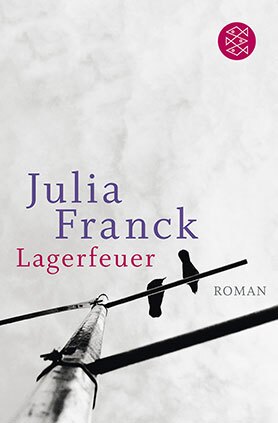Julia Franck
Lagerfeuer
[Campfire]
- S. Fischer Verlag
- Cologne 2003
- ISBN 3-8321-7851-1
- 302 Pages
- Publisher’s contact details
Julia Franck
Lagerfeuer
[Campfire]
Published in Arabic with a grant from Litrix.de.
Sample translations
Review
Who is willing to swap “sausage spread and ham sausage” for “processed cheese and strong-smelling Tilsiter of the lowest grade“? These questions are the stuff of everyday life for so-called “escapees from the Republic” (the GDR) at the Marienfelde Refugee Camp in the late seventies.
In her latest novel, Campfire, Julia Franck gives three of these people from the no-man’s-land between East and West a voice of their own, letting them speak vicariously for “we isolated ones, refugees, migrants, emigrants”. For it is as just such a compulsory collective that the camp inhabitants experience themselves when confronted with the new world outside to which they have not (yet) been admitted . From three different points of view, each providing a kind of log of the narrator’s daily life, we learn of the different fates of these people who have come to start a new life in West Germany.
One of them is Nelly Senff, a beautiful young chemist. Several years after the father of her two children mysteriously commits suicide, she is finally granted permission to leave the country with ten-year-old Katja and eight-year-old Aleksej. Her pretext is that she is going to marry a man from West Berlin; in fact, he is only an accomplice to her escape. This comparatively law-abiding way of leaving the country is an escape nonetheless – albeit for purely private reasons, not political or religious ones.
After her lover’s death she felt more and more “unable to go on living” in the GDR. “She was buried alive, with all her memories. That was why she wanted to come here. To get rid of her memories.” Life seems possible only in a place free of memories: “For me there was no more sense in staying there. The places all have associations with him, it’s impossible for me to see them differently. Another country with the same language, but without those places – that’s the reason why I’m here.” With all her strength she struggles to forget, to start anew. At the same time, she is not proof against the eternal interrogations, first by the East German Stasi, then by the Western intelligence services: “there’s nothing left in my head, empty, listened out, all listened up”.
This strong, sensitive female character becomes the natural focus of Franck’s narrative; grouped around her are the other three voices that lend expression to this cross-section of German-German reality. In the Marienfelde reception camp, this place of transitions where many life-paths cross, the fates of four narrators merge into a quarter-year of coexistence. They are all united by the fact that their dream of the “golden West” and of a new life is abruptly put to an end.
This is true of the naive Pole Krystyna, who gives up her life as a cellist to have her gravely-ill brother treated in the state-of-the-art West and finally ends up selling the cello as well. But even treatment in a West German hospital cannot cure her brother’s cancer. In the end, Krystyna is left alone in the camp with her senile father.
Then there is Hans Pischke, a former actor who was imprisoned in the GDR for dumping red paint on a statue of Lenin. After serving several years of his sentence he was ransomed by the West, and since that time he has not ventured out of the camp for fear of Stasi informers. Ironically enough, the rumor spreads in the camp that he works as an agent for the Stasi. Like the others, he fails to find the hoped-for happiness in the West: “Haven’t you noticed that we live in a camp with a wall around it, in a city with a wall around it, in the middle of a country with a wall around it? You think the golden West, the great freedom is in here, inside the walls?“ Hans Pischke, at any rate, no longer believes it.
The last of the four voices is John Bird’s. He is not one of the newcomers who have arrived in search of happiness – he is an agent of power. He works for the CIA. It is his job to verify the refugee status of the camp inhabitants in individual interrogations and expose suspected East German spies. He regards himself as the representative of a better world order and accordingly demands “humility before the independence and freedom that you experience as soon as you escape the Eastern Bloc.” But he, too, is an unhappy, impotent figure. His marriage is scarred by alienation, and even his brief affair with Nelly Senff is purely physical. To the last, he remains trapped in his own inability to form relationships.
For all the characters in this polyphonic historical/political novel, the great promise of the West is demolished bit by bit. Instead of the much-vaunted freedom, they only find other forms of unfreedom and dependency. The conclusion of the novel is ambiguous. The Christmas tree around which the camp inhabitants gather at the end goes up in crackling flames – just as their expectations of happiness have been engulfed. No one – including the reader – can imagine what will follow this Campfire which gives so little warmth.
Campfire is a novel about an episode of German-German history which till now has largely been neglected, with clear autobiographical overtones, yet gripping for reasons that go beyond authenticity. It is a historical/political novel that does not seek a one-sided settling of accounts, neither with the GDR nor with the humiliations which the West inflicts upon the newcomers. Julia Franck left the GDR at the age of eight with her mother and her sisters.
Her personal experiences, with their extra dimension of historical depth, undergo a powerful literary transmutation: the stifling confinement of the camp, the sense of alienation outside, the fear and suspicion inside and the violence on both sides as borderline experiences in the true sense of the word.

In her latest novel, Campfire, Julia Franck gives three of these people from the no-man’s-land between East and West a voice of their own, letting them speak vicariously for “we isolated ones, refugees, migrants, emigrants”. For it is as just such a compulsory collective that the camp inhabitants experience themselves when confronted with the new world outside to which they have not (yet) been admitted . From three different points of view, each providing a kind of log of the narrator’s daily life, we learn of the different fates of these people who have come to start a new life in West Germany.
One of them is Nelly Senff, a beautiful young chemist. Several years after the father of her two children mysteriously commits suicide, she is finally granted permission to leave the country with ten-year-old Katja and eight-year-old Aleksej. Her pretext is that she is going to marry a man from West Berlin; in fact, he is only an accomplice to her escape. This comparatively law-abiding way of leaving the country is an escape nonetheless – albeit for purely private reasons, not political or religious ones.
After her lover’s death she felt more and more “unable to go on living” in the GDR. “She was buried alive, with all her memories. That was why she wanted to come here. To get rid of her memories.” Life seems possible only in a place free of memories: “For me there was no more sense in staying there. The places all have associations with him, it’s impossible for me to see them differently. Another country with the same language, but without those places – that’s the reason why I’m here.” With all her strength she struggles to forget, to start anew. At the same time, she is not proof against the eternal interrogations, first by the East German Stasi, then by the Western intelligence services: “there’s nothing left in my head, empty, listened out, all listened up”.
This strong, sensitive female character becomes the natural focus of Franck’s narrative; grouped around her are the other three voices that lend expression to this cross-section of German-German reality. In the Marienfelde reception camp, this place of transitions where many life-paths cross, the fates of four narrators merge into a quarter-year of coexistence. They are all united by the fact that their dream of the “golden West” and of a new life is abruptly put to an end.
This is true of the naive Pole Krystyna, who gives up her life as a cellist to have her gravely-ill brother treated in the state-of-the-art West and finally ends up selling the cello as well. But even treatment in a West German hospital cannot cure her brother’s cancer. In the end, Krystyna is left alone in the camp with her senile father.
Then there is Hans Pischke, a former actor who was imprisoned in the GDR for dumping red paint on a statue of Lenin. After serving several years of his sentence he was ransomed by the West, and since that time he has not ventured out of the camp for fear of Stasi informers. Ironically enough, the rumor spreads in the camp that he works as an agent for the Stasi. Like the others, he fails to find the hoped-for happiness in the West: “Haven’t you noticed that we live in a camp with a wall around it, in a city with a wall around it, in the middle of a country with a wall around it? You think the golden West, the great freedom is in here, inside the walls?“ Hans Pischke, at any rate, no longer believes it.
The last of the four voices is John Bird’s. He is not one of the newcomers who have arrived in search of happiness – he is an agent of power. He works for the CIA. It is his job to verify the refugee status of the camp inhabitants in individual interrogations and expose suspected East German spies. He regards himself as the representative of a better world order and accordingly demands “humility before the independence and freedom that you experience as soon as you escape the Eastern Bloc.” But he, too, is an unhappy, impotent figure. His marriage is scarred by alienation, and even his brief affair with Nelly Senff is purely physical. To the last, he remains trapped in his own inability to form relationships.
For all the characters in this polyphonic historical/political novel, the great promise of the West is demolished bit by bit. Instead of the much-vaunted freedom, they only find other forms of unfreedom and dependency. The conclusion of the novel is ambiguous. The Christmas tree around which the camp inhabitants gather at the end goes up in crackling flames – just as their expectations of happiness have been engulfed. No one – including the reader – can imagine what will follow this Campfire which gives so little warmth.
Campfire is a novel about an episode of German-German history which till now has largely been neglected, with clear autobiographical overtones, yet gripping for reasons that go beyond authenticity. It is a historical/political novel that does not seek a one-sided settling of accounts, neither with the GDR nor with the humiliations which the West inflicts upon the newcomers. Julia Franck left the GDR at the age of eight with her mother and her sisters.
Her personal experiences, with their extra dimension of historical depth, undergo a powerful literary transmutation: the stifling confinement of the camp, the sense of alienation outside, the fear and suspicion inside and the violence on both sides as borderline experiences in the true sense of the word.

By Anne-Bitt Gerecke
